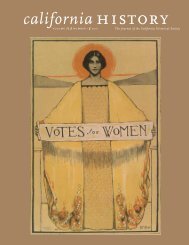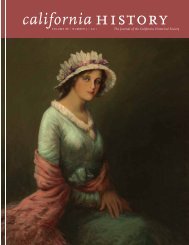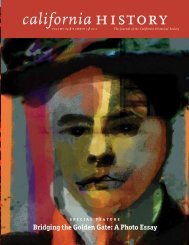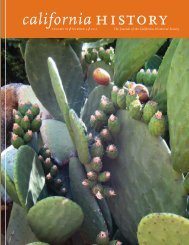Volume 90, Number 1 - California Historical Society
Volume 90, Number 1 - California Historical Society
Volume 90, Number 1 - California Historical Society
Create successful ePaper yourself
Turn your PDF publications into a flip-book with our unique Google optimized e-Paper software.
Sully were promptly married by the local priest,<br />
who was later removed from his post for performing<br />
this ceremony without parental consent. Sully<br />
appeared unaware that his actions might have<br />
compromised the priest and insulted the young<br />
admirer who had unwittingly escorted Manuela to<br />
her wedding, but he could not ignore the offense<br />
he caused her parents. “The old folks are as mad<br />
as well can be,” he wrote. “I went to see them &<br />
was invited never to show my face again.” 9<br />
a “JudgMent FroM god”<br />
Manuela’s parents had reason to feel cheated, but<br />
for Angustias the betrayal was deeply personal,<br />
coming as it did from someone she had treated<br />
as a member of her family. The betrayal was symbolized<br />
by the gold ring that Sully had intended<br />
to wear in her honor. In June 1850, a month after<br />
his furtive wedding, he wrote home to thank his<br />
family for sending it: “The steamer of yesterday<br />
brought me two letters & the ring, which is pronounced<br />
beautiful. Manuela has it.” 10<br />
Angustias was slower than her husband to forgive<br />
Sully, but she reconciled with him when she<br />
learned that Manuela was pregnant. By imposing<br />
on this proud family and violating the code by<br />
which they lived, however, Sully had set the stage<br />
for tragedy. In late March 1851, less than two<br />
weeks after giving birth, Manuela fell violently<br />
ill and died after eating what Sully called a “fatal<br />
orange” sent to her as a present. It was rumored<br />
afterward that the gift came from a disappointed<br />
suitor, who had poisoned the fruit. Sully had<br />
urged her not to eat the orange, fearing that it<br />
might be bad for her, but her mother thought it<br />
would do her no harm and consulted the physician<br />
(her future husband, James Ord), who gave<br />
his consent. “Thus by the ignorance of a doctor<br />
I have been robbed of a treasure that can never<br />
be replaced,” Sully lamented. His black servant,<br />
Sam, who was devoted to Manuela, became so<br />
distraught after her death that he killed himself,<br />
believing “that in the world to come we would all<br />
be united once more together.” The final blow for<br />
Sully came a short time later, when Angustias,<br />
who had recently given birth, took Manuela’s<br />
infant to bed with her to nurse the boy and fell<br />
asleep with him in her arms. “When she woke<br />
up he was dead,” Sully wrote. “She had strangled<br />
it in her sleep. The doctor persuaded her it<br />
died of a convulsion, but to me alone he told<br />
the true story.” 11<br />
In his shock and grief, Sully may have misinterpreted<br />
these terrible events. The “fatal orange”<br />
was just one possible cause of the sudden intestinal<br />
torments Manuela suffered before she died<br />
(she may have contracted cholera). And Sully’s<br />
assertion that Angustias “strangled” the infant<br />
in her sleep hinted perhaps at an unconscious<br />
motive on her part—lingering hostility toward<br />
him—that existed only in his imagination. But<br />
whether those deaths and Sam’s demise were the<br />
result of “ignorance & violence,” as he put it, or<br />
random misfortunes beyond anyone’s control,<br />
Sully had reason to feel that dreadful punishment<br />
had been visited on him and his in-laws.<br />
“It appears like a judgment from God for some<br />
crime that I or her family have committed,”<br />
he wrote. 12<br />
aFter the Fall<br />
Sully was surely aware that the act he believed<br />
set this tragedy in motion—eating a forbidden<br />
fruit—was like the original sin that brought God’s<br />
judgment on Adam and Eve. The fact that his<br />
new family’s devastating fall from grace occurred<br />
in <strong>California</strong>, a bountiful land likened to Eden,<br />
made that biblical precedent hard to ignore. But<br />
there were other reasons, rooted not in myth but<br />
in history, for Sully to feel that he, as a representative<br />
of the expanding American empire, or<br />
his in-laws, as heirs to the old Spanish imperial<br />
11









